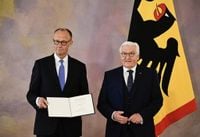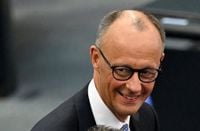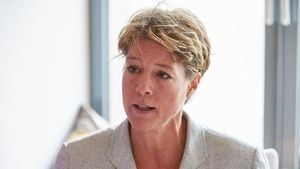On Tuesday, May 6, 2025, Friedrich Merz was elected as the new Chancellor of Germany by the Bundestag in a dramatic second round of voting. Merz, the leader of the center-right Christian Democratic Union (CDU) and its Bavarian sister party, the Christian Social Union (CSU), secured 325 votes out of 630 deputies, surpassing the 316 votes required for an absolute majority. This victory comes after a surprising defeat during the first voting round earlier that day, where he garnered only 310 votes, six short of the majority needed.
Merz's election marks a significant political moment for Germany, as it is the first time since World War II that a Chancellor has lost a parliamentary vote. His initial failure to secure the necessary support highlighted the fragility of the coalition he formed with the center-left Social Democrats (SPD), which had been in negotiation for over two months following the federal elections in February, where the CDU/CSU emerged as the largest party.
In February, the CDU/CSU coalition won the elections with 28.5% of the vote, translating to 208 seats in the Bundestag. However, this was not enough for a majority, necessitating a coalition with the SPD, which received only 16.4% of the vote. The coalition agreement outlines plans to stimulate economic growth through corporate tax reductions and energy price cuts while also committing to increased military spending and strong support for Ukraine amid ongoing geopolitical tensions.
Merz, who is 69 years old, began his political career as a European parliamentarian in 1989. His election as Chancellor represents his first governmental role after a long career that included a hiatus from politics between 2009 and 2021, during which he returned to the legal profession. With a cabinet composed predominantly of new members, many of whom have private sector experience, Merz is tasked with addressing the pressing economic challenges facing Germany.
The German economy is currently experiencing its worst downturn since the 2008 financial crisis, with a recession that has lasted two years. The International Monetary Fund (IMF) projects that Germany's GDP will remain stagnant at 0% growth in 2025, following contractions of 0.3% in 2023 and 0.2% in 2024. Inflation has also been a concern, rising to 8% in 2022, 6% in 2023, and 2.4% in 2024, contributing to widespread dissatisfaction among the German populace.
Merz's initial failure to secure the chancellorship was attributed to dissatisfaction among some SPD members, reflecting deeper divisions within the coalition. The right-wing Alternative for Germany (AfD), which finished second in the February elections with 20.8% of the vote, has called for new elections following Merz's first-round defeat, claiming that the current coalition lacks a solid foundation of support.
In response to the political turmoil, Merz's coalition partners have expressed the need for stability. Jens Spahn, the CDU parliamentary leader, emphasized the urgency of moving forward, stating, "Europe needs a strong Germany, so we cannot wait days." This sentiment resonated with many in the Bundestag, leading to the swift decision to hold a second vote on the same day.
Despite the challenges ahead, Merz's election is seen as a pivotal moment for Germany's political landscape. He is expected to face significant pressure to deliver on economic recovery while navigating the complexities of coalition governance. The coalition agreement allocates 10 ministerial positions to the CDU and seven to the SPD, with key roles filled by members from both parties. Boris Pistorius remains as Minister of Defense, a position he held under the previous government.
As Merz prepares to lead Germany, he will have to balance the expectations of his coalition partners with the pressing needs of a nation grappling with economic stagnation and rising inflation. His leadership style and ability to unify the coalition will be critical in the coming months as Germany seeks to stabilize its economy and reaffirm its position in Europe.
With a history of political maneuvering and a clear agenda for economic reform, Friedrich Merz's tenure as Chancellor begins at a time of uncertainty but also of potential. The decisions made in the coming weeks and months will not only shape his legacy but also the future of Germany in a rapidly changing global landscape.






